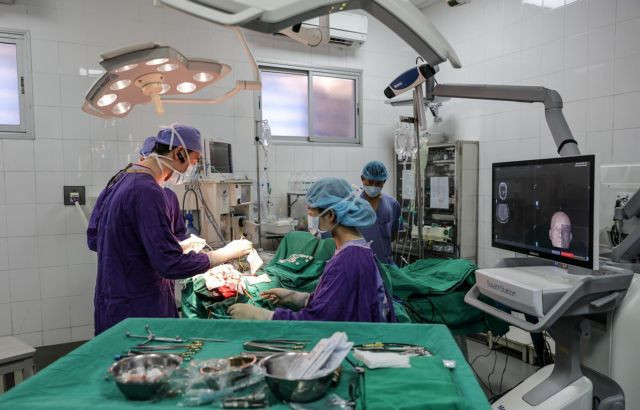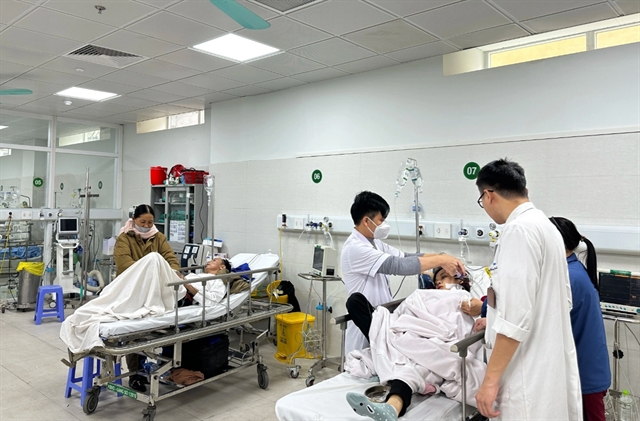 |
| Doctors at the Việt Đức Hospital perform surgery. VNA/VNS Photo Minh Sơn |
Việt Đức Hospital, the primary surgical centre in northern Việt Nam, has announced the suspension of all elective surgeries starting Wednesday.
This decision was made to allocate medical equipment and resources towards patients in critical condition, leaving many patients waiting for treatment.
The hospital accommodates thousands of patients daily for diagnoses, treatment, and other medical needs, though it is not the only major healthcare establishment in the country struggling with shortages.
“When we halt elective surgeries, the patients are put at a disadvantage," said Professor Trần Bình Giang, director of the Việt Đức Hospital. "They are not in an emergency but suffering pain while waiting for the surgery. However, we can not do anything without medical equipment and chemicals.”
Cumbersome regulatory requirements for bidding and procuring medical supplies have only exacerbated the issue.
As a result of this policy change, nearly a hundred patients have had their scheduled surgeries delayed or postponed.
The hospital administration will prioritise conducting surgeries for individuals in critical or emergency conditions, hoping that this decision will improve patients' overall quality of care.
In 2022, nearly 80,000 surgeries were conducted at the hospital, around 210 a day.
On the first day the suspension took effect, the approved surgeries changed dramatically, the Dân Trí (Intellectuals) newspaper reported.
One department at the hospital had 19 elective surgeries scheduled on Wednesday, but only six were approved.
“Patients who suffer injuries or degeneration will have their surgeries postponed as their diseases do not progress day by day or are not life-threatening," the newspaper cited a doctor as saying. "While waiting for the surgery, doctors will instruct them to use splints as well as a pain reliever and anti-inflammatory.
“If the patient closely follows the doctor’s guidelines, the diseases will not become more severe, and a waiting time of three to four weeks is acceptable. However, the delay can not be too long as it will affect their life and work,” the doctor said.
Another hospital doctor said he has been busy answering patients’ enquiries about the delay.
The doctor said it was heart-wrenching work. Many want to know how long they must wait, while others have to borrow money for surgery that is now delayed. Almost all are worried about the consequences of the delay.
Talking about a patient from Hải Dương Province who is waiting to have his joint replacement surgery, the doctor said the doctor is put in a difficult situation as they can not do anything without medical supplies, so the patient has no choice but to wait.
 |
| Many major hospitals in Việt Nam are suffering from medical supply shortages. Photo dantri.com.vn |
Việt Đức Hospital is still seeking help from the Ministry of Health to facilitate its auction and procurement process.
Even when the auction and procurement of medical supplies go smoothly, it will take at least a month for the hospital to normalise its surgical activities, according to the hospital’s director Giang.
Thousands of people visit the hospital daily for diagnoses, treatments and other medical requests.
Major hospitals in Việt Nam have suffered a shortage of medical supplies since early last year. This is partially due to the expiry of circulation registration numbers for some drugs and delays in bidding and procurement, particularly following the arrest of many officials in the health sector for being related to violations in bidding and procurement.
Over recent years, some hospitals have piloted financial autonomy, but it coincided with the COVID-19 pandemic, leading to temporary shutdowns. This created financial difficulties for the hospital.
Minister of Health Đào Hồng Lan admitted the difficulties, saying that the health sector would focus on administrative reform, raising the quality of treatment, and taking drastic measures to deal with the medical supply shortage this year.
During a working session with leaders of the Ministry of Health, the Ministry of Finance and the Ministry of Planning and Investment, and centrally-run hospitals on February 25, Deputy Prime Minister Trần Hồng Hà asked relevant ministries to promptly amend regulations and decrees under their authority to fix obstacles faced by hospitals.
The same day, PM Phạm Minh Chính signed an official dispatch requesting measures to ensure the supply of medicines, medical equipment, and materials for health examination and treatment.
In the dispatch, the PM assigned ministries, ministry-level and governmental agencies, and People’s Committees of centrally-run cities and provinces to promptly inspect the situation and offer timely guidelines to medical stations to fix the problem.
Official statistics released in July 2022 showed that 82 per cent of medical facilities and 57 per cent of central hospitals, or 12 out of 21, lacked medicine and equipment, forcing patients and their families to buy their supplies from outside vendors, including the most basic tools like needles and bandages. VNS